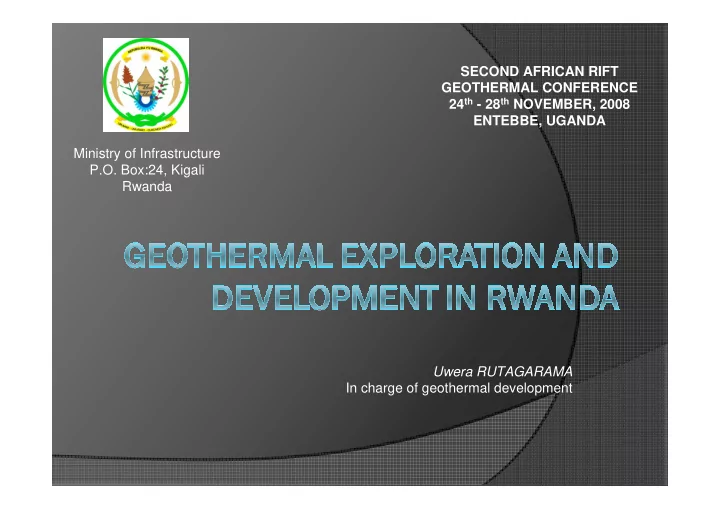

SECOND AFRICAN RIFT GEOTHERMAL CONFERENCE 24 th - 28 th NOVEMBER, 2008 ENTEBBE, UGANDA Ministry of Infrastructure P.O. Box:24, Kigali Rwanda Uwera RUTAGARAMA In charge of geothermal development
Introduction � Area : 26,338 Km 2 � Population : 9 million of inhabitants � Energy consumption � Biomass: 95% � Oil products: 4 % � Electricity: 1%
Electricity context � Installed capacity: 77 MW � Available capacity: 59 MW � Sources of electricity � Hydro: 56% � Thermal: 39% � Solar: 0.3% � Methane gas: 5.7% � Electricity tariff : 22 US cents/KWh
Electricity context Category Name Installed Capacity (MW) Available Capacity (MW) In house Hydro Power 27.25 20 Ntaruka 11.75 6 Mukungwa 12.5 11 Gihira 1.8 1.8 Gisenyi 1.2 1.2 Imported Hydro Power 15.5 11.5 Rusizi 1 (SNEL) 3.5 3.5 Rusizi 2 (SINELAC) 12 8 Micro Hydro Power Nyamotsi 0.075 0.075 In House Thermal 14.37 7.8 Power Jabana 7.8 7.8 Gatsata 1 1.8 0 Gatstata 2 4.77 0 Rental Thermal Power 15 15 Aggreko 1 10 10 Aggreko 2 5 5 Solar Power Kigali Solar 0.25 0.25 Methane gas Kibuye Power 1 4.5 4.5 TOTAL 76.945 59.125
Interest in geothermal energy development � Indication of existence of geothermal resources � High demand of electricity � High electricity prices � Diversification of energy resources � Clean source of energy
Geothermal potential Geothermal potential and development in and development in Rwanda Rwanda
The East African Rift system Geothermal potential in Rwanda 170-300 MW
Prospective geothermal zones � National volcanoes zone � Lake Kivu faults
Hydrothermal manifestations Thermal area in Mashyuza Thermal area in Gisenyi
Geothermal Geothermal development History development History
Evaluated prospects - Studies: BRGM (1982- 1983); Chevron (2006) - Reconnaissance and limited surface exploration carried out in the Western (Rusizi, Rubavu and karongi), Southern (Karaba) and Northern (Musanze and Nyabihu) parts of the country - 18 hydrothermal and mineralized springs identified and analyzed
Geothermal zones: Volcanoes National Park The National Volcanoes in the Northern part of Kivu Lake comprises eight big volcanic structures. Five of them are situated in Rwanda: - Muhabura - Gahinga - Sabyinyo - Bisoke - Karisimbi
Geothermal zones: Cyangugu zone Located in the Southern part of Kivu Lake. It is situated in the Eastern part of the distensive system on Rusizi Graben with an orientation similar to the National volcanoes system N-S. The hydrothermal manifestations (hot springs and the travertine deposit) are linked to this type of structure.
Geochemical parameters
Geochemical parameters
Geochemical analyses from Gisenyi, Mashyuza and Lake Kivu
Ongoing geothermal Ongoing geothermal activities activities
Ongoing study � Geothermal Resource assessment � An implementation agreement for a joint geothermal assessment and capacity building project signed in November 2007 between the Government of Rwanda (GoR) and the German Federal Institute for Geosciences and Natural Resources (BGR) � Study area: Gisenyi –Volcanoes area � Geological analysis , geochemical sampling of springs and Geophysical exploration in the study area completed in collaboration with the Kenya Electricity Generating Company KENGEN .
Capacity building � WB geosciences and geothermal capacity building needs assessment completed. � Training of four Rwandans in a short course on surface exploration for geothermal resources (2007, 2008) in Kenya � Training of one Rwandan for a six month course (April- October 2008) at the United Nations University Geothermal Training Programme (UNU-GTP)in Iceland � Contact made with the UNU-GTP for training of more Rwandan candidates in Iceland for the years 2009-2011
Future development Future development
Future Development � Detailled geophysical surveys in the Gisenyi- Volcano area � Drilling of exploratory wells on the promising area � Development of a pilot power plant � Detailled geological, geochemical and geophysical surveys on promising sites. � More training of Rwandans for each steps
Conclusions Conclusions
Conclusions � Development of geothermal energy : A priority for the Government of Rwanda � Evaluate properly Rwanda geothermal resources � Look for financing for the development of geothermal energy � Assistance for training of experts required in Rwanda � Participation of private and public partnership in the sector is encouraged � Existence of incentives to attract private sector investments in the sector � Rwanda to be a member of and benefit from the African Rift Geothermal Development Facility
THANK YOU
Recommend
More recommend